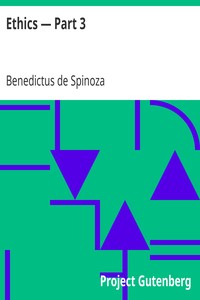Ethics — Part 3 by Benedictus de Spinoza
"Ethics — Part 3" by Benedictus de Spinoza is the third part of a philosophical treatise written between 1661 and 1675. This section explores the origin and nature of human emotions, arguing that all beings strive to preserve their power and perfection. Spinoza examines how desire underlies our emotional lives, analyzing joy and sadness as fundamental building blocks. He connects virtue to power and investigates when the mind acts with adequate ideas
versus when it remains passive with inadequate understanding. (This is an automatically generated summary.)
Read or download for free
| Reading Options | Url | Size | |||
|---|---|---|---|---|---|
| Read now! | https://www.gutenberg.org/ebooks/948.html.images | 164 kB | |||
| EPUB3 (E-readers incl. Send-to-Kindle) | https://www.gutenberg.org/ebooks/948.epub3.images | 117 kB | |||
| EPUB (older E-readers) | https://www.gutenberg.org/ebooks/948.epub.images | 118 kB | |||
| Kindle | https://www.gutenberg.org/ebooks/948.kf8.images | 220 kB | |||
| older Kindles | https://www.gutenberg.org/ebooks/948.kindle.images | 209 kB | |||
| Plain Text UTF-8 | https://www.gutenberg.org/ebooks/948.txt.utf-8 | 149 kB | |||
| Download HTML (zip) | https://www.gutenberg.org/cache/epub/948/pg948-h.zip | 115 kB | |||
| There may be more files related to this item. | |||||
Similar Books
About this eBook
| Author | Spinoza, Benedictus de, 1632-1677 |
|---|---|
| Translator | Elwes, R. H. M. (Robert Harvey Monro), 1853- |
| Title | Ethics — Part 3 |
| Note | Wikipedia page about this book: en.wikipedia.org/wiki/Ethics_(Spinoza_book) |
| Credits | Produced by an anonymous Project Gutenberg volunteer |
| Reading Level | Reading ease score: 62.8 (8th & 9th grade). Neither easy nor difficult to read. |
| Language | English |
| LoC Class | B: Philosophy, Psychology, Religion |
| Subject | Ethics |
| Category | Text |
| EBook-No. | 948 |
| Release Date | Jun 1, 1997 |
| Most Recently Updated | Apr 14, 2013 |
| Copyright Status | Public domain in the USA. |
| Downloads | 542 downloads in the last 30 days. |
| Project Gutenberg eBooks are always free! | |

